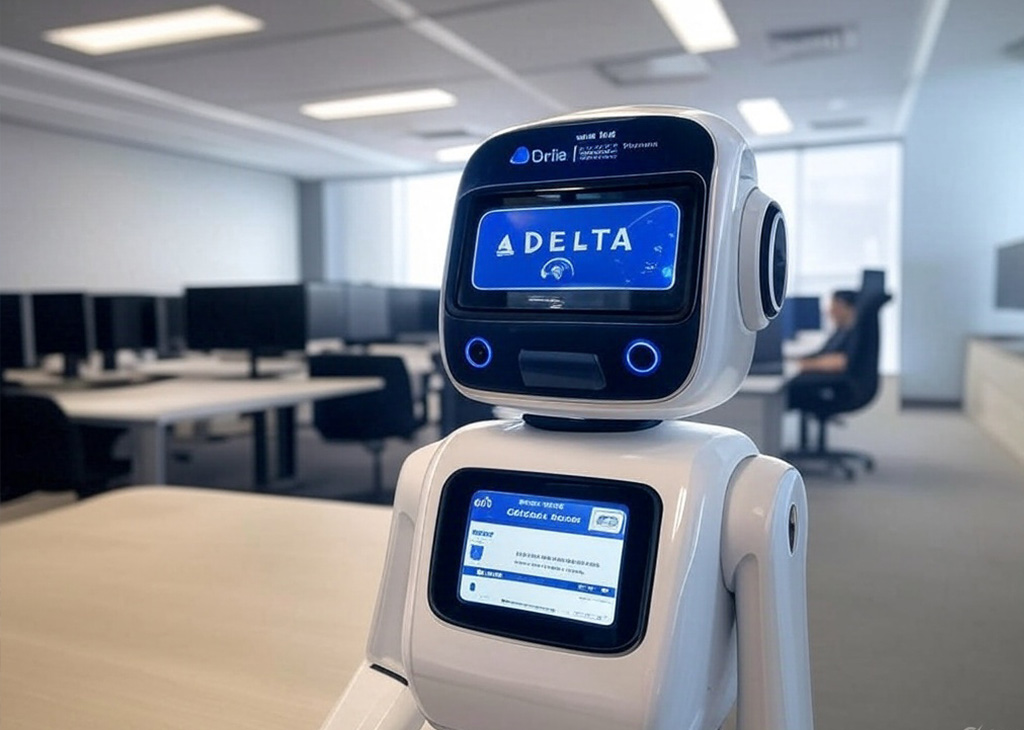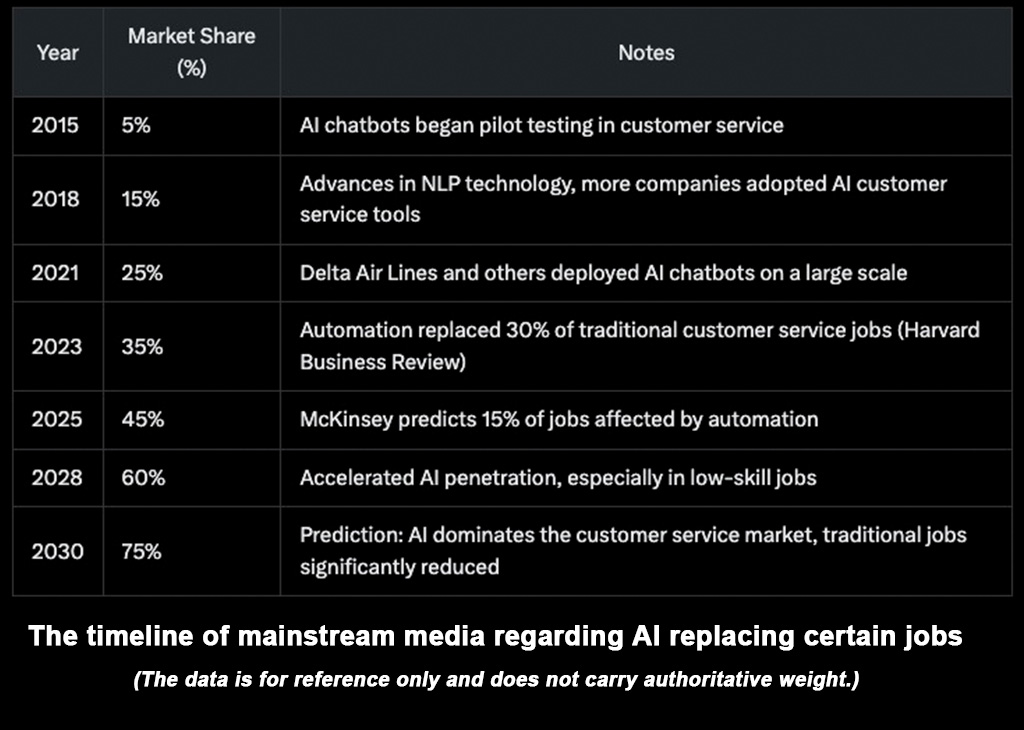How A.I. and Automation Are Changing the U.S. Job Market
AI and automation are revolutionizing across industries — the U.S. and North America being no exception. From the factory floor to the customer service desk to the data-crunching office, these technologies are rapidly altering the playing field. Others are sweating bullets, worried their jobs might vanish. But here's the silver lining: they're also sparking new gigs that no one saw coming. Let's get into the ways that AI and automation are upending the American job market, the problems they create and the opportunities they present and what the word on the street is on all of it.

Sci-Fi In The Real World: Artificial Intelligence and Automation
What once seemed to be the stuff of science fiction novels is now just another day at the office. There are robots that assemble cars on Tesla's production lines, and Amazon's warehouses hum with bots that can move quicker than any human. This isn't just about speeding things up — AI and automation are slashing costs and increasing efficiencies in ways we haven't seen before. Fifteen percent of the world's jobs will feel the pinch of automation by the end of 2025, according to a McKinsey & Company report, especially those whose work is repetitive and predictable.
But it's not all bad news. And while it's bloodied low-skill jobs, AI is also creating whole new industries that didn't exist a decade ago. Fields like data analysis, A.I. development and machine learning — and all in desperate need of talent. According to U.S Bureau of Labor Statistics (BLS), demand will be exploding for data scientists and AI engineers in the next couple of years. And it's leading to new jobs we never could have predicted — and jobs that require different skills to sail along with this tech tsunami.
All at Once, Jobs are Changing Manufacturing (and Low-skill) Jobs
Manufacturing has been ground zero for automation, dating back to the 1970s, when robots first started to supplant workers on car assembly lines. Fast-forward to 2024, and it's next-level — AI isn't just assisting, it's a driving force. Retail behemoths like Walmart and Home Depot are all-in on automation for their warehouses and logistics. Imagine: Robots that can sort and stack packages in minutes — no coffee break needed. It's a massive time-saver, cutting down the risk of human error and speeding things up too.
The downside? Low-skill workers have been feeling the heat. By 2025, 75 million low-skill jobs around the globe will be gone because of automation, according to McKinsey's estimates — imagine factory workers, warehouse employees, and basic service jobs. In the U.S., this is translating into large swathes of people who are facing job loss without any clear path to a brighter future.
But here's some good news: for every position that disappears, higher-skill jobs are being created. There may be fewer pair of hands at factories to churn out goods, to be sure, but manufacturers need data analysts to help understand what machines are producing, robot technicians to make sure the bots are humming and specialists in artificial intelligence to optimize the systems. As a result, companies and governments are launching reskilling programs to help workers move into those new roles and fill the gap. This is not a cure-all, but at least it is a beginning.
Training the Model and the Customer Service: A New world
Even in customer service, A.I is causing waves. Now many companies' first lines of defense are chatbots, answering simple queries—and tougher conversations—thanks to natural language processing (NLP). The A.I. chatbot Delta Air Lines launched that lets passengers check flights and book tickets without talking to a person. It's a no-brainer, Delta claims, because the new technology reduces waiting times and frees up human representatives for the hard stuff. Walmart is doing it, too, deploying A.I. to field routine questions from shoppers and free employees to do more consequential work.
Sounds great — if you're not one of the customer service reps whose job just got axed. Pascal Tanguay/Journal SentinelAI will increasingly take on the basics, according to a Harvard Business Review study which predicts that more than 30% of U.S. customer service jobs could disappear. The squeeze is hitting hardest in industries such as dining, retail and call centers, catching low-skill workers scrambling.
Another area undergoing a transformation is data science. AI can process huge data sets in seconds, churning out insights that help companies make better decisions. In finance, insurance and marketing, companies are finding faster and cheaper A.I. tools to take the place of human analysts. It's a triumph of efficiency, but a brutal fucking kick in the teeth for the people who used to do the number-crunching.
Jobs Most at Risk: Which People Are on the Chopping Block?

To be fair — some jobs are more at risk than others. Here are five jobs that AI and automation are likely to disrupt, and what that may mean for workers:
Factory Workers: Robots have been replacing these for decades, and it's only going to speed up. Tesla's assembly lines are a robot army — welding, assembling, and so on. McKinsey says millions of factory jobs could vanish in the world by 2025. Status update from Amazon's warehouses: Another hot spot, where bots are seizing picking and packing jobs, leaving human workers in the dust.
Customer Service Reps: AI chatbots are the new MVPs in this position. Delta's bot books flights like a champ, and Walmart's A.I. responds to frequently asked questions, so people don't have to. But that means fewer jobs for people in call centers or retail support — jobs that require little training but employ many people.
Data Entry Clerks: You enter info into spreads all day? AI's got this one covered. In health care, AI tools are digitizing patient records faster than any human could. So are finance and legal, automating data-entry work to cut costs. Now that's a tough gig to hold on to.
Driver and Delivery Workers: This one is a target of self-driving tech Walmart's testing self-driving trucks to deliver goods, and driverless taxis aren't far away. Long-haulers, delivery drivers, even dispatchers — they're all about to lose their jobs to AI taking the wheel.
RETAIL CASHIER: Ever used a self-checkout at a grocery store? That's the future. Amazon's Amazon Go stores let you grab your items and leave — your phone does the paying. As retail begins to habituate shoppers to self-service, traditional cashier jobs are vanishing fast.
The not-so-funny challenges and opportunities
Coming Trenches – The End Is Near For the Job Market Here's where the breakdown is:
Challenges:
Low-skill job losses: Those 75 million jobs that McKinsey urged to flag? These are largely unskilled jobs — assembly lines, warehouses and rudimentary service gigs. That's particularly bad news for workers like the thousands who rely on these jobs to pay the rent and put food on the table—all at positions that have also been growing for low income people. They are therefore ill equipped to turn to something else, and the shift is grueling.
Fretting Over a Skills Gap: The job market is moving up the skills ladder, but many people can't keep up. Retraining takes time, money and determination — attributes not all workers have in excess. The urgency to reskill can feel overwhelming.
Opportunities:
New Industries, New Jobs: A good AI doesn't just kill jobs—it makes them. All of these fields, including data science and machine learning and AI engineering, are booming. These are high-brainpower roles that do pay well too.
Increase in Efficiency — Automation can often multiply productivity, which boosts economic growth. That does mean higher living standards and potentially fatter paychecks for those who can adapt.
Buzz: What People Are Saying on Social Media
There's no shortage of talk about AI across the internet, notably on Twitter and Reddit. Between the fourth quarter of 2024 and the first quarter of 2025, posts concerning technology replacing jobs were up 40%. Some see promise in A.I. to make work more efficient and accelerate progress; others worry that it will widen the wealth gap and leave low-wage workers behind. Diving into the fray on Twitter was an artificial intelligence expert, Joseph Hopkins: We're at a turning point — AI can open the door to amazing opportunities, but we need to ensure everyone gets a slice of the pie.
How Workers Can Stay Ahead
Fearful that AI is coming for you job? Don't panic—pivot. Here's how to play it smart:
Solidify your tech acumen Data-centric jobs — data scientist, AI engineer — are gold mines at this point. Renew your coding, data analysis or machine learning. These skills are not just in demand — they will help you stay relevant.
Lean Into What Humans Can Do: AI can't do creativity or empathy — not yet. Careers in art, design, teaching or counseling are informed by those core human characteristics and therefore are safer bets.
Add Some AI Into The Mix: Don't fight the tech — have it come to your aid. In health care, doctors are augmenting AI with diagnosis to become more efficient. Whatever your field, understand how AI can supplement your ability, not replace it.
The Road Ahead
Automation and artificial intelligence are overturning the rules that govern work in America. That might obliterate low-skill jobs in manufacturing, customer service and other industries — but it will also open new frontiers in tech-focused areas. But this transition is a team sport — it's governments, companies and workers finding a path for reskilling, reimagining and rebuilding. Adjust, work hard and you will find your place in this bold new world.
